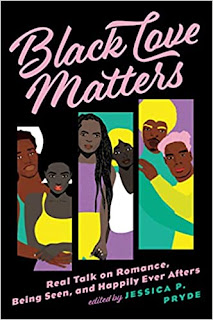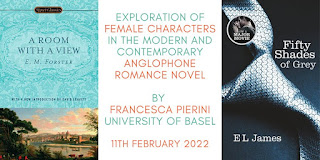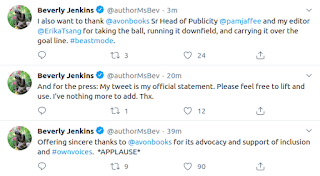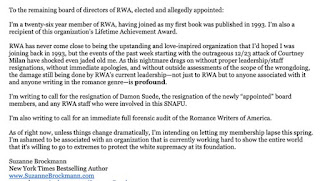Claire Ryan
reports that
Dr. Natalie Tindall, RWA Academic Grant Committee Chairperson, and one
other committee member resign. (Information received by email from Dr.
Tindall)
Staying with the academic perspective, Dr Jodi McAlister
has commented that
From an academic perspective: one thing I already knew but that this debacle has made even more clear to me is that to studying the literary sphere is just as (and often more) important than studying texts themselves.
The "genre worlds" approach (Fletcher, Driscoll & Wilkins 2018), which holds that a genre world is comprised not just of a body of texts but also by a sector of the publishing industry & a social formation/s, is going to be *very* useful in parsing this in future scholarship, imo
Of particular relevance to this situation is Fletcher, Driscoll and Wilkins's comment that
A genre world is a social entity defined by interaction between its participants. This kind of interaction includes (but is not limited to) discussions and feedback with writing buddies and writing groups, mentors, and editors both pre- and postpublication, discussions and panels between authors and readers, and reader feedback given to the author directly (via social media or “fan mail”) and indirectly (via reviewing sites such as Goodreads). Genre worlds also “distinguish between significant and peripheral participants” (Becker 35), and an author is less likely to be influenced by a single reader than to be influenced by an editor or peer. (1008)
Here's a
letter to the RWA signed not "by a single reader" but by over 1300. A similar letter, from
reviewers and librarians has also been sent. But since writers' peers are clearly extremely important, it might be relevant to see what some of the "big names" of romance have to say about the RWA crisis.
Beverley Jenkins has been speaking out about this from the start. Here's one of her
earlier tweets, with the #IstandwithCourtney hashtag:
Suzanne Brockmann
expressed her support for radical change from the 24th onwards:
and on
2 January posted a letter to the Board which, among other things, contains a statement that she is "
ashamed to be associated with an organization that is currently working hard to show the
entire world that it's willing to go to extremes to protect the white supremacy at its foundation."
On 29 December Nora Roberts issued a
statement (archived
here, which I'm mentioning because her website was loading rather slowly) about the developments at RWA:
Writer, the middle word in Romance Writers of America, is a word without
gender, a word without color or race, a word without sexual
orientation, without creed. We’re writers, and as such must expect to be
treated, must demand to be treated, fairly and equitably by our
professional organization.
That's just part of her post, in which she outlines why she left the RWA some years ago and concludes
Let me add, as a personal note, that over the course of my life, the
course of my career, the couple hundred books I’ve written, I may
have–most likely have–said or done or written something that was
offensive, racist, homophobic. Without intent–but intent doesn’t mean a
damn to those hurt. So I’ll apologize without qualification.
I hope I’ve learned along the way. I intend to continue to learn and do better.
One assumes that the RWA holds/held these authors in high esteem, since they're Past Recipients of the
RWA Lifetime Achievement Award: Suzanne Brockmann (2018); Beverly Jenkins (2017); Nora Roberts (1997).
Roberts is also a member of the
RWA Hall of Fame, as is Julia Quinn. Julia Quinn
has commented that "members of RWA leadership acted inappropriately and in violation of many organization rules" and has therefore signed the petition to recall the President of RWA.
Lisa Kleypas, a two-time RITA-winner is also among the
Romance Trailblazers for her "
Popularization of the non-aristocratic hero in historical romance" and "Early historical fat representation." In 2018 one of her novels was criticised for orientalism.
Kleypas responded by writing that:
In my life, I’ve had a lot to learn AND unlearn. All I can say
is, I’m sorry. Thank you for helping me to understand the lack of
awareness I had about this issue. Obviously I would never want to hurt
anyone by perpetuating an offensive stereotype, especially about women
from a culture I respect so tremendously, and I feel terrible about it.
I will make changes to the book immediately, so all future
editions will be culturally sensitive and mindful of how every single
character is portrayed. Thank you again for making me aware of this and
teaching me something I needed to understand, both as an author and as a
person.
Kleypas has also
signed the recall petition.
J. R. Ward, who has been "nominated for multiple RITAs, and won three times" has written (on 31 December) that the current events and the revelations that have come out as a result of them have opened her eyes to much that she was not aware of:
My relationship with RWA was awesome and uncomplicated because I’m white
and I’m heterosexual and I’m physically able. I didn’t know any of
that other sh*t was going on because I’m white and I’m heterosexual and
I’m physically able. I didn’t look any further than my own experience
because I’m white and I’m heterosexual and I’m physically able- and all
of that means I don’t have to.
And that’s white privilege in action right here.
Like Roberts, she acknowledges potential issues within her own works:
I am sure over the course of the books I’ve written that there are things that have been microaggression
s or been ignorant or offensive. I’m sure I’ve done things that are all of that in personal or correspondence.
I want to put a stake in it right here that I am apologizing for any
of those mistakes. I’m trying to learn and be better and do better. I
am not going to get it right, now or in the future, but I am committed
to keep trying and keep learning, and I am so grateful for the POC in my
life who are helping me along the way.
I'll add more statements if I come across them. Here's an article from 30 December
in the New York Times. As of this date, the RWA "Board and Staff" appeared
unmoved
The full archived text of that statement can be found
here. But here's part of it:
"We do not take positions for or against specific literary criticism [...] We do, however, have explicit policy for our members' professional conduct. [...] In accordance with RWA policy, the Ethics panel met and delivered its report to the Board, dismissing all charges against Ms. Milan except one: a violation of the association's express purpose of creating a "safe and respectful environment" for its community of writers. [...] RWA is not alone in trying to balance free speech with civil discourse and the damage - personal and financial - its absence can do. It is, however, up to us to find a pathway forward to meet the competing needs of free expression without subjecting our members to harassment, intimidation, and financial loss. [...] In an abundance of caution over confusion regarding RWA's policies and procedures, the complaint against Courtney Milan has been closed and no action is being taken at this time. [...] Our members have strong opinions, which we applaud. But when expressed inappropriately, and in some cases far worse, by our organizational leadership - past and present - these can result in personal and financial harm to members.
This would appear to:
a) continue to characterise certain forms of literary criticism as "unacceptable behavior" which can be construed as "harassment" and "intimidation"
b) does not appear to apply the same criteria to racist primary texts as it does to literary criticism
c) does not address the "personal and financial harm to members" caused by actions of RWA members and staff, as detailed online over the past few days.
[And editing again to add that
an article about the situation was published in
The Guardian on 31 December.
Another article appeared on 2 January on NBC News's website, written
by Mikki Kendall, who summarised the situation thus:
The complaint against Milan was fundamentally
that her criticisms — accurate though they were — had cost other writers
opportunities by drawing attention to their flaws. So the real issue
isn't whether her criticism about racist elements in other writers' work
was accurate, but whether some writers might lose money because of
those criticisms.
This is about writing,
but it is also about our culture and whether we want the people who have
traditionally influenced it to continue to do so without engaging with
the consequences their work might visit on other communities.
An author statement
by Caroline Linden, also from 2 January, outlines suggested norms for authors with regards to reviews:
I don't think saying a book has racist content is bullying. I don't
think the vast majority of reviewing is bullying, if the reviewer
honestly believes what she writes. Authors may hate what the reviewer
says, may think the reviewer is mean or too picky or flat-out wrong, but
that is part of being an author. You put those words and that story out
there, and the world gets to comment on it. It ain't all five-star
raves.
Olivia Waite used her column
in the Seattle Review of Books to discuss the crisis. And archivist Steve Ammidown, at the Bowling Green State University's Popular Culture Library, is
trying to archive all the relevant online posts.
On 4 January an interview with Kathryn Lynn Davis was
published in The Guardian (their second article on the RWA crisis). In it Davis
said she was “encouraged” by the administration of Romance Writers of
America (RWA), a trade association for romance writers, to file a formal
complaint against Milan, an influential former board member and
diversity advocate. She now feels she had been “used” to secure a
political outcome that she had never intended.
She also clarified that, contrary to what was written in her complaint, "she did not have and lose a written book contract, but
that a publisher had delayed further discussion of a potential contract
in the wake of the controversy." Davis also states that she "decided to make some changes to the novel Milan had criticized [...] and that she has republished edited ebook
versions."
As noted in the article, literary agencies have also been withdrawing support from the RWA. Claire Ryan, who is still keeping track of events,
noted that on 3 January
-
-
Gallt and Zacker Literary Agency
publish an open letter to the RWA stating that they will not attend any RWA events until the current leadership is replaced and there is a full audit into the complaints against Courtney Milan. The open letter is signed, at time of posting, by thirty six agents from notable agencies.
All this provides support for the genre worlds model with respect to norms and behaviours. Davis still seems to be implying that Milan was in the wrong for how she expressed her criticism: Davis says she has now made changes to her novel not because of Milan's comments but because "people have contacted me and have
told me calmly what it was that offended them" (emphasis added). However, it is evident she has has felt the pressure of the behaviours being modelled by significant authors and the weight of the opinions of other significant players in romance publishing.]
---
Fletcher,
Lisa, Beth Driscoll, and Kim Wilkins. ‘Genre Worlds and Popular
Fiction: The Case of Twenty-First-Century Australian Romance’,
Journal of
Popular Culture
51.4
(2018): 997-1015.





























